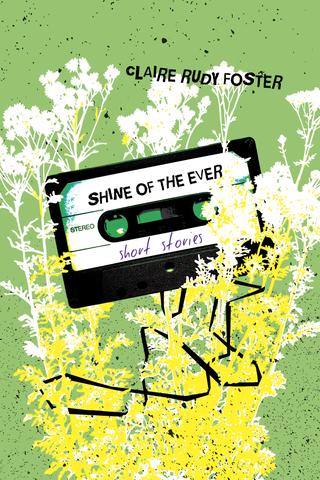
by Julia Tagliere
When a book’s jacket copy describes it as a “literary mixtape,” it’s safe to assume music will play a significant role in its pages, a promise abundantly confirmed in Claire Rudy Foster’s latest collection, Shine of the Ever, published in November 2019 by Interlude Press, an award-winning boutique publisher of LGBTQ+ general and romantic fiction.
The collection’s mixtape feel and title, from the song “Velouria,” by the 90s alt-rock band Pixies, and Foster’s frequent references throughout to the band’s music (as well as their opening story/fan letter “The Pixies”) not only help establish a loose structure for this compilation of queer and trans stories set in 1990s Portland, but also serve as a kind of score for the collection’s tone and narrative rhythm.
While Foster’s use of Pixies song titles and lyrics is undeniably effective at evoking the particular vibe of 90s-era Portland, their literary interpretation of the Pixies’ “loud-quiet” musical style (Nirvana lead man Kurt Cobain, describing their influence on his own music, said in a January 1994 interview with Rolling Stone, “We used their sense of dynamics, being soft and quiet and then loud and hard.”) is what gives this collection such beautiful cohesion.
In “The Pixies,” for example, the first in this collection of thirteen stories, Foster’s collective narrator delivers what feels a like a monologue, set in a club filled with the ecstasy of those finding belonging in their community, with the music “pushing on the walls” and “growling into something massive and golden.” Foster first uses the narrative interplay of “we” and “you” to establish a poignant bulwark of distance between the narrator and an imagined (though still sadly grounded in reality in many places) reader, and then immediately establishes the loud-quiet, harsh-hush rhythm that will run through each of their stories:
Some of us look like punks and some don’t but we’re all wearing the costume of belonging. We’re not welcome in your church, you know. This club is our church and it’s loud, loud, loud. The voice of God is in the bass reverb and the lyrics’ rising incantation. You told us that we were as good as dead. You said we have that gay disease. You copy and steal from us; you never give credit. You’re desperate to catch whatever we’ve got…
We will do things our way. We will stomp to the office in work boots and wear safety pins in our ears. We will leave the glitter in our eyebrows after Pride. We will grow old gracelessly and live in sin and teach our children to argue with anyone, even us, even God. Even I’ll adore you, we sing, even as our hearts ball up in our throats…
For all the loud, crashing defiance in most of this passage, that last phrase, “our hearts ball up in our throats,” rolls across the reader with a sudden Pixies-like hush, conjuring someone holding back tears, a moving contrast to the “loud, loud, loud” rally cry-feel of the rest.
In “Domestic Shorthair,” the narrator, who has “perfected the art of acting straight” and deploys tales of an “imaginary boyfriend” to help maintain the act, shares with a work colleague special huckleberry cream puffs; the description of her roommate Amanda’s baking them is a soft, sweet metaphor for her unrequited love for her roommate:
Our place smelled like heaven, like powdered sugar and Meyer lemon mixed together in sweet almond paste. One time she made a whole tray of cream puffs filled with huckleberry cream and glazed with honey, sprinkled with bee pollen and raw sugar—fairy food.
But after the cream puffs are gone, the narrator returns to the gut-punch of her work, collecting physical evidence from a rape victim for the police:
I held her hand and scraped under her nails, trying to capture any hair, skin, or other DNA that might be trapped there. She leaned toward me while I wiggled the curved manicure tool against her nail bed.
‘I’m almost through,’ I said. ‘I’m sorry I can’t be more gentle.’
‘You smell like magic donuts.’ She leaned her head on my shoulder. I wasn’t supposed to, but I let her stay there until the sample was done.
In “Littermates,” Abby, a transgender person and recovering alcoholic, hangs out at the park with Lauren, a member of her recovery group, and a puppy Lauren is training for its new family.
Foster’s softness here largely revolves around the puppy: “The puppy didn’t need that much encouragement; it ran right onto her lap and put its paws on her chest. Lauren was definitely a she.” Abby begins to consider taking the puppy home, thinking, “I tried imagining it. What if this time, the story was different? I wondered. The dog liked me…”
But the harshness, which Abby directs largely inward, arrives swiftly, coming in the rest of that same sentence: “…and it wasn’t confused by my body or my voice or the other things about me that seemed to repel humans. I’d never had something in my life that wasn’t puzzled by me, including myself.”
While some of these loud or harsh parts of Foster’s work involve difficult subject matter—the collection comes with a content warning from the publisher—in other pieces, Foster uses that Pixies-esque alternating rhythm to explore something (marginally) less unsettling: the fear of taking a relationship to the next step. In “Venus Conjunct Saturn,” for example, Angie, a post-gender reassignment woman, fears Kate won’t want to continue their relationship once she learns about her past; the harshness unfolds here as Angie justifies that fear with stark recollections of her previous experiences:
She knew she’d try to tell Kate tonight and have faith that maybe, this time, she wouldn’t feel horribly ashamed or exposed. Maybe Kate wouldn’t sit there and say hateful, transphobic things, or make Angie feel like a fraud or like she should apologize for the way she lives, or degrade Angie, or make cruel comments about Angie’s appearance, about passing or the way Angie liked to have sex…
When the soft, hushed moment of truth finally arrives in a scene of the gentlest, quietest intimacy, Angie allows Kate to see her scars. The beautiful loud here is not something dark and grim, but instead complete love and acceptance, and it is loud enough, for the moment, to drown out all other things:
It felt so good, to trade who she’d pretended to be for someone who was loved, universally, and the blaze was brighter and brighter until she could hold nothing back, and its heat held all of her and Kate, illuminating every tender place.
Foster’s “literary mixtape” is undeniably an homage to a past time and place, 1990s Portland. But it is also a love letter to the band that seems to have provided a virtual soundtrack for it, as well as a keenly observant, well-paced, and deeply honest collection about the lives and loves of queer and trans people trying to figure themselves (and everybody else) out, just like anyone else.
Shine of the Ever is available from Interlude Press.
_____________________________________
 Julia Tagliere’s work has appeared in The Writer, Potomac Review, Gargoyle Magazine, Washington Independent Review of Books, and numerous anthologies. Winner of the 2015 William Faulkner Literary Competition for Best Short Story and the 2017 Writers Center Undiscovered Voices Fellowship, she completed her M.A. in Writing at Johns Hopkins University. She serves as an editor with The Baltimore Review and is seeking representation for her next novel, The Day the Music Didn’t Die. Follow her at justscribbling.com.
Julia Tagliere’s work has appeared in The Writer, Potomac Review, Gargoyle Magazine, Washington Independent Review of Books, and numerous anthologies. Winner of the 2015 William Faulkner Literary Competition for Best Short Story and the 2017 Writers Center Undiscovered Voices Fellowship, she completed her M.A. in Writing at Johns Hopkins University. She serves as an editor with The Baltimore Review and is seeking representation for her next novel, The Day the Music Didn’t Die. Follow her at justscribbling.com.

 The core workshop of SmokeLong Fitness is all in writing, so you can take part from anywhere at anytime. We are excited about creating a supportive, consistent and structured environment for flash writers to work on their craft in a community. We are thrilled and proud to say that our workshop participants have won, placed, or been listed in every major flash competition. Community works.
The core workshop of SmokeLong Fitness is all in writing, so you can take part from anywhere at anytime. We are excited about creating a supportive, consistent and structured environment for flash writers to work on their craft in a community. We are thrilled and proud to say that our workshop participants have won, placed, or been listed in every major flash competition. Community works.